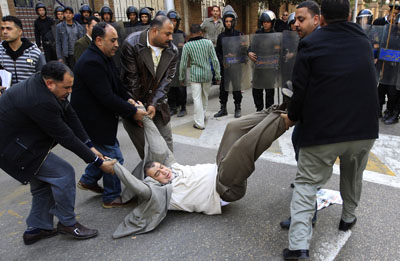New York, January 26, 2011–The Committee to Protect Journalists condemns the violence against journalists covering demonstrations in Egypt. Plainclothes and uniformed security personnel have beaten at least 10 journalists between Tuesday and today and detained others. Egyptian authorities have also shut down the websites of two popular independent newspapers and a number of social media sites.
The protests began on Tuesday after an Internet campaign called for a national “Day of Anger” through anti-government protests, according to news reports. The demonstrations are the largest since the January 1977 bread riots.
“We call on Cairo to bring to an immediate end all forms of violence against the media, release all detained journalists, and lift online censorship,” said Mohamed Abdel Dayem, CPJ’s Middle East and North Africa program coordinator.
Egyptian authorities have blocked access to at least two websites of local online newspapers: Al-Dustour and El-Badil, local journalists told CPJ. The government has also blocked domestic access to social networking sites Twitter and Facebook, as well as Bambuser, a video-streaming website, according to multiple news reports, although sources on the ground tell CPJ that access to Facebook is intermittent. “It is an attempt to black out information and to stop the use of social media and communication to block those who are demanding democracy,” Gamal Eid, executive director of the Cairo-based Arabic Network for Human Rights Information, told CPJ.
Local and international journalists have been widely targeted during the demonstrations. At least six journalists working for Al-Masry al-Youm were assaulted by security forces: Ahmad al-Howari, Mustafa al-Mursafawi, Nashwa al-Houfi, Hisham Omar Abdel Halim, and Maha al-Bahnasawi, the independent daily reported. Lina Attalah, the managing editor of Al-Masry al-Youm‘s English edition was also attacked. Attalah was covering the demonstrations in downtown Cairo when police blasted water cannons and tear gas. “I started running but four policemen pulled me by my hair and kicked me in my face and back,” Attalah told CPJ via phone. “I tried telling them that I’m a journalist but they were too busy kicking me.” Her glasses were broken and police confiscated two cell phones.
Al-Jazeera correspondent Mustafa Kafafi was also beaten. “I fell on the street and I started screaming ‘Let me go, I’m a journalist,’ but they didn’t care,” Kafafi told CPJ today. “Only after they found out that I’m with Al-Jazeera did they leave me alone.” Two journalists, Mohamed Abdel Qudous and Yahya Qalash, both members of the Egyptian Journalists’ Syndicate, were also attacked and arrested today, according to local news reports. They were among seven or eight journalists rounded up from the front steps of the syndicate. Al-Jazeera reported that among them was veteran journalist Karem Yehya.
Al-Hayat television reported today that station journalist Ahmad Hassan Kamel has not been heard from since covering the demonstrations in Cairo Tuesday night, and believes he has been detained.
Among journalists from international media outlets who have been attacked and beaten was Jack Shenker, the U.K. Guardian‘s correspondent in Cairo, who was arrested then released on Tuesday, the paper reported. The Associated Press reported that Egyptian police have detained an AP cameraman and his assistant–Haridi Hussein Haridi and Haitham Badry–while they were covering the demonstrations in Cairo today.
